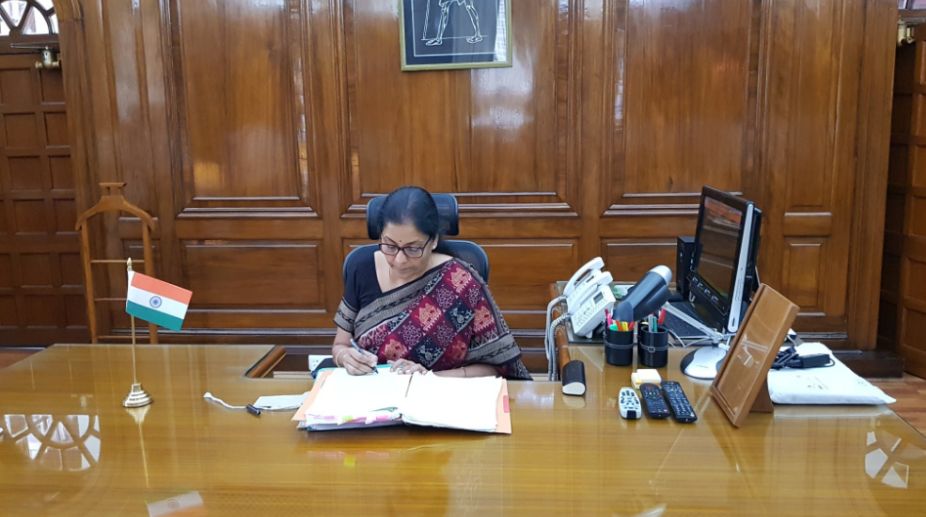Eyebrows were raised on the appointment of Nirmala Sitharaman as the new Defence Minister of India breaking the glass ceiling. ‘Will she be able to perform’ is the question many defence experts and politicians are asking.
Sitharaman herself views her appointment as cosmic grace. Certainly Prime Minister Modi must have made some political calculations in choosing her for her loyalty to him, for her low profile and and her clean image.
Also she hails from the south where the BJP is trying to make inroads. The new Defence Minister certainly knows the huge challenges ahead in heading a sensitive ministry, which has hitherto been a fiefdom of men.
“My priority will definitely be the armed forces’ preparedness. It is important that the Indian armed forces receive the attention in terms of giving them every endowment and equipment necessary for them to perform their duty with the best of equipment available,” she said soon after assuming office on Thursday.
She has taken over the portfolio at a time when India is facing security challenges from China and Pakistan – two important neighbours with nuclear capability.
Also Jammu and Kashmir is not stable and the Western and Eastern borders are not quiet. After the Doklam crisis, it is clear that India needs much more focus on the infrastructure on the border.
Though the Defence ministry has been given control of the border roads, the pace of infrastructure development is not fast.
Sitharaman is no doubt smart and works very hard but Defence is a totally new area to her. It is not as if her predecessors had great knowledge of military matters but with just 18 months at her disposal before the 2019 polls, she has to fast forward everything to meet deadlines. Even politically the ‘Faujis’ are an important constituency for the BJP and the poll promises made before the 2014 polls need to be delivered.
Her first challenge will be making quick decisions. Though Manohar Parikkar held the full-time charge earlier, he was slow in clearing files. Arun Jaitley is praised for his understanding of the issues and taking decisions.
Jaitley has focused on three major areas – restructuring the army, implementing pay commission hikes for soldiers and accelerating the involvement of the private sector in “ Make in India’ projects.
Sitharaman has to take them forward. The second is desisting pressures from various quarters for military deals. Since Defence contracts are huge, there is heavy lobbying from both domestic and international players.
Several important deals are under finalisation at various levels. Going by her track record, Nirmala would not be adventurous.
Thirdly, she has to work within the limited space available for her to function. Defence is a well-oiled ministry and does not need much tinkering. Moreover, the Prime Minister’s office is very powerful and has a final say on all major issues.
Linked to that is creating synergy between the armed forces and the bureaucracy. The forces believe that the bureaucracy has an upper hand and resent their armtwisting methods.
Fourthly and most importantly, her toughest jobs will be modernisation and military preparedness. Much needs to be done in this regard if one goes by the remarks of the CAG who has indicated that the army has barely enough ammunition to last for 10 days.
There is need to strengthen combat capabilities of the three services in view of the changing regional security scenario.
Defence procurement is also a major issue. All three forces are ready with mega purchase plans for ships and tanks. Many foreign powers including the US, Germany, Russia and France are interested in doing business with India.
The government is looking at deals worth Rs.50,000 crores that are in the pipeline.
These include procurement of battle tanks, fighter jets, submarine and several weapons. Fifthly, there is need for reforms like cutting the military flab. There is a proposal to re-deploy 57,000 defence personnel to prune departments by 2019.
As a woman Defence minister, will she be gender sensitive? She claims to have an open mind on the role of women in combat jobs. India’s first female pilots are preparing to fly warplanes later this month.
In short, her main challenges include modernising the military, ushering in of big-ticket reforms, protecting the volatile borders and arranging funds for military expenditure.
There is need to usher in several military reforms including the creation of a chief of defence staff, restructuring the Defence PSUs and preparing for space and cyber readiness to fight future wars. Prime Minister Modi has had three defence ministers in as many years.
The job needs a full time minister giving 24/7 attention and Sitharaman has promised that. Her advantage is that she has the ears of Modi, who considers her loyal to him.
She has got a double promotion, as she will also be at the high table of the Cabinet.
She must be given time to settle down, and not judged in haste. She will be judged by how well she tackles her new portfolio in the next 18 months.












